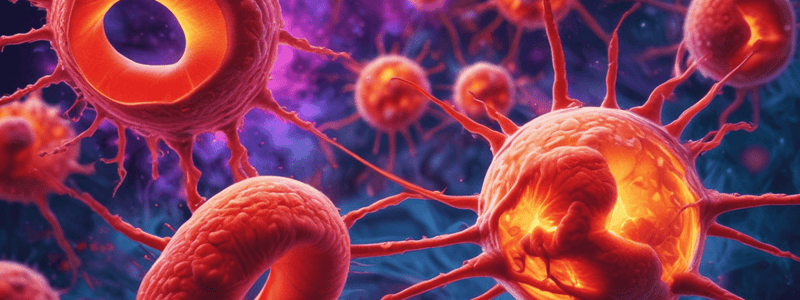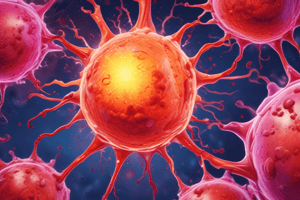Podcast
Questions and Answers
What are the 4 phases of inflammation?
What are the 4 phases of inflammation?
Dilute Destroy Isolate Initiate
Differentiate between acute and chronic inflammation.
Differentiate between acute and chronic inflammation.
Acute inflammation involves an excess of blood in the vessels, while chronic inflammation is prolonged and leads to tissue destruction and fibrosis.
How are macrophages formed?
How are macrophages formed?
Macrophages are formed from monocytes that travel, arrive, change to macrophages, proliferate, and then are immobilized.
What activates macrophages?
What activates macrophages?
Describe granulomatous inflammation.
Describe granulomatous inflammation.
List some examples of chronic inflammatory diseases.
List some examples of chronic inflammatory diseases.
What is a granuloma?
What is a granuloma?
What are the types of granulomatous inflammation?
What are the types of granulomatous inflammation?
What are the systemic effects of inflammation?
What are the systemic effects of inflammation?
What are the favored sites of implantation for blood-borne organisms?
What are the favored sites of implantation for blood-borne organisms?
What are the manifestations of septic shock?
What are the manifestations of septic shock?
What are the characteristics of Langhan's giant cells?
What are the characteristics of Langhan's giant cells?
Explain the difference between immune granulomas and foreign body granulomas.
Explain the difference between immune granulomas and foreign body granulomas.
Describe the characteristics of Langhans giant cells.
Describe the characteristics of Langhans giant cells.
Explain the process of systemic vasodilation in septic shock.
Explain the process of systemic vasodilation in septic shock.
What are the systemic effects of inflammation and how do they manifest?
What are the systemic effects of inflammation and how do they manifest?
List some examples of diseases associated with immune granulomas.
List some examples of diseases associated with immune granulomas.
Explain the role of tissue-resident macrophages in preventing overwhelming infection.
Explain the role of tissue-resident macrophages in preventing overwhelming infection.
What are the key immune cells involved in chronic inflammation?
What are the key immune cells involved in chronic inflammation?
Describe the process of granulomatous inflammation.
Describe the process of granulomatous inflammation.
What distinguishes acute inflammation from chronic inflammation?
What distinguishes acute inflammation from chronic inflammation?
How do macrophages contribute to chronic inflammation?
How do macrophages contribute to chronic inflammation?
What are the systemic effects of chronic inflammation?
What are the systemic effects of chronic inflammation?
Discuss the role of IL-10 in chronic inflammation.
Discuss the role of IL-10 in chronic inflammation.
Flashcards are hidden until you start studying




